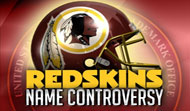
While the Washington Redskins trademark and logos are the source of heated debate, we seem to have ignored the fact that the team’s intellectual property belongs to them, as granted by the U.S. government dating back more than 80 years. Therefore, the U.S Patent and Trademark Office’s decision to revoke the trademark is an attack on intellectual property and the start of a slippery slope for businesses trying to protect their property rights.
This is all about ideology, and not about the legality of a trademark. Does this mean that as a business owner I have to look over my shoulder for fear that the U.S. Patent and Trademark Office can void my intellectual property at any moment? Can the government now decide on a whim what trademarks are offensive?
What powerful force caused the U.S. Patent and Trademark Office to revoke the trademark of the Washington Redskins? A lawsuit brought by five American Indians who contend the name disparages them.
Currently, there are 600 trademarks that carry an American Indian image. These are held by 450 companies. Is the U.S. Patent and Trademark Office going after all of these? Are these five American Indians going to be spending the rest of their lives in court?
This case could start an avalanche of attacks on intellectual property. I wouldn’t be surprised if the lawyers representing the Aunt Jemima and Uncle Ben’s brands are huddling late in the night in the event some black Americans decide to bring suit over their brand’s depiction of black Americans.
I want to be clear that America should never denigrate any group of people. But if people feel slighted and maligned, this should be settled in the courts, not mandated by the U.S. government.
As a nation we cannot take the value of intellectual property lightly.
In their “Economic Value of Intellectual Property” white paper, economists Robert Shapiro and Kevin Hassett estimate that U.S. intellectual property today is worth between $5 trillion and $5.5 trillion, equivalent to approximately 45 percent of U.S. GDP and greater than the GDP of any other nation in the world.
One would think that this property is worth protecting. Yet, the U.S. Patent and Trademark Office seems not to understand that intellectual property is a business’ private property, and capitalism protects private property.
So when the government attacks a trademark, they are sending a message that intellectual property has no value. They picked on the Redskins’ trademark because it is a very valuable trademark that has served its owners and fans well.
Forbes estimates the Redskins’ annual revenue was estimated at $373 million, but it is unclear how much of that comes from merchandise.
This move by the U.S. Patent and Trademark Office represents an opportunity to remind Americans why it is vital to protect intellectual property.
One of the reasons America leads the world in innovation is that we hold the greatest number of patents and trademarks. Measured as patents per capita, the United States takes first place by a large margin, followed by Japan, Switzerland, Finland and Israel. The late Steve Jobs at Apple held 317 patents by himself.
Why is this important? “Countries with weak intellectual property protections receive less direct foreign investment; and the investment they receive is less technologically sophisticated. Moreover, the advanced technologies and products, which multinational companies transfer to those developing markets that protect intellectual property rights, often diffuse to domestic firms, increasing the rate at which those firms and their countries develop their own intellectual property,” according to Shapiro and Hassett.
So imagine the perception among those countries that ignore intellectual property when even the American government seems to undervalue the integrity of its own domestic trademarks.
The Organization for Economic Co-Operation and Development has estimated that counterfeiting and piracy costs companies as much as $638 billion a year, losses greater than the total GDP of all but 12 countries. Around the world, between 35 percent and 40 percent of all commercial, packaged software and musical recordings sold every year are thought to be counterfeit.
Our U.S. Patent and Trademark Office is charged with protecting intellectual property. According to its own website: “The role of the Patent and Trademark Office is to grant patents for the protection of inventions and to register trademarks. It serves the interest of inventors and businesses with respect to their inventions and corporate products, and service identifications. It also advises and assists the bureaus and offices of the Department of Commerce and other agencies of the government in matters involving ‘intellectual property’ such as patents, trademarks and semiconductor mask works.”
Based on this description, is America being served when a legally granted trademark is revoked by the U.S. Patent and Trademark Office? How does this protect intellectual property?
I can certainly understand why American Indians might feel disparaged, but the Washington Redskins trademark issue has become bigger than an issue about perceived injustice. Like most things, it has turned into a political weapon, prompting Sen. Harry Reid, D-Nev., to interrupt the Senate floor to take on this issue. Maybe my memory is going, but I don’t remember Reid ever advocating so passionately on behalf of American Indians, especially since his home state of Nevada has always had a strong American Indian presence.
Let’s have a real discussion on ways that trademarks can protect every American, and not used for political gain.
© 2014 Moneynews. All rights reserved.
Urgent: Should Obamacare Be Repealed? Vote Here Now!
JUN



